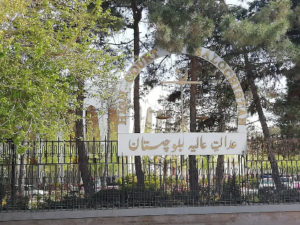LIMITATION OF APPLE VALUE CHAIN IN BALOCHISTAN AND GOOD AGRICULTURE PRACTICES (GAP)
Jamil ul Rehman Tareen
Balochistan is the largest producer of apples in Pakistan. Apple is one of the major deciduous fruits of Balochistan. Apple is the second-largest fruit after dates in Balochistan. Apples are grown in the highland of Balochistan. The most grower districts are Ziarat, Quetta, Mastung, Kalat, Killa Saif Ullah, Killa Abdullah, and Pishin. Apple varieties that are grown in Balochistan are Ture Kulu (Red Delicious), Shine Kulu (Golden Delicious) Kashmiri, Amri, and Kaja. Both Ture Kulo and Shine Kulu are famous varieties for their very attractive color and taste throughout Pakistan.
Balochistan produces fruits of high quality but the supply chains of the apple fruits are faced with limitations such as the use of traditional production and marketing technology, climate change issues (reduction in precipitation, rise in temperature, shortage of irrigation water) lack of appropriate technology, use of inputs at improper times, miss management during pre-harvest and post-harvest practices, inadequate education of insects pests and pathological diseases control, expensive input (fertilizer, pesticide, packaging materials, etc) shortage of capital, low electricity voltage, poor quality pesticide, expensive transport, poor farm to market road, lack of cold storage in each apple grower districts, shortage of technical knowledge about apple crops, unskilled labor and inadequate education about application of pesticides and fertilizer , which not only effects the produce but also significantly reduce of the amount of produce. Injudicious use of pesticides and fertilizers have adversely effected the natural resources, like soil, air, water, quality and safety of food. Farmers mainly use synthetic chemicals for the control of pests but these are used unwisely. These all issues are making Pakistan uncompetitive in the international market and affected the apple value chain and, it also affecting the welfare of the local consumers adversely
As high quality and healthy food are becoming more important, consumers have concerns about the control of food production and demand more information along the food chain. Good agriculture practices (GAP) is based on the principle of risk prevention, risk analysis, sustainable agriculture (by mean of integrated pest management (IPM), and integrated crop management (ICM) to continuously improve the farming system.
Aim of the Good Agriculture Practices (GAP) is food safety, quality assurance and protecting workers and consumers’ health. It requires ensuring safety throughout the food chain. It must be compulsory and transparent and operate not only from the table but also upstream to conclude supplier, e.g. fertilizer, plant protection etc.
Good agriculture practices (GAP) will provide important advantages for developing countries like Pakistan not only for the domestic market but also export markets. Therefore, introducing and expanding good agriculture practices in Pakistan (Apple Value Chain) will provide some advantages to those countries who trade food with Pakistan so implementation of good agriculture practices is important for the whole horticulture food chain from field to fork.
However, Pakistan does not have the international infrastructure for supporting good agriculture standards at the farm level in terms of their implementations. United Nations Industrial Development Organization (UNIDO) has worked extensively on raising awareness on food safety and sustainability in Pakistan (apple value chain in Balochistan). Farmers need to fulfill high standards on food safety and sustainability, and worker health and safety.
So followed the good agriculture practices, guidelines in the apple value chain for better quality products and reduced input use especially hazardous pesticides and fertilizer for apple fruits.
The author is an Agriculture Officer (SF)
Master trainer of UNIDO for the project PAFAID






